Articles about reggae music, reviews, interviews, reports and more...
Interview: Clinton Fearon Part 2
- Home
- Articles
- Interviews
- Interview: Clinton Fearon Part 2

Interview: Clinton Fearon Part 2
"You are an artist, you are a poet, you are dealing with literature, you are putting out what tomorrow’s world is supposed to be like, or is gonna be like. It’s in your hands, so what are you doing towards it?"
Sampler
In this second part of the interview with his wife Catherine, Clinton is looking at the past, talking about the Gladiators, his time at Studio One and Black Ark. He is sharing his hard time starting all over when he settled in Seattle, the creation of Boogie Brown, his work with musicians and his interest for acoustic music. Clinton is also presenting a bit of his philosophy, based on love and respect.
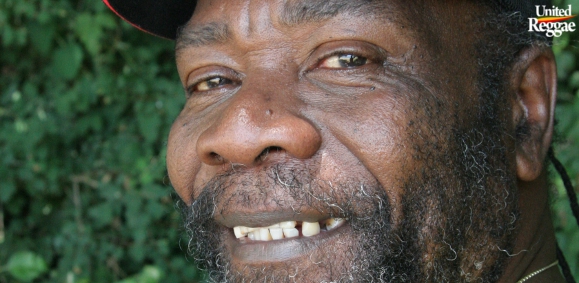
It’s hard not to talk about The Gladiators.
Yes in some way, yes.
You spent 18 years with them. It’s a big part of your career.
It’s a big part of my career.
Do you still have contact with them?
Yes, with some of them. The last person I spoke with was Gallimore Sutherland. I also have contact with Clinton Rufus some times, with Stanley Brian, who used to be drummer in Gladiators (he is not in the band anymore). Not too long ago I spoke with Al Griffiths, that’s Albert’s son, who is leading the group right now. We talked for a while. So yes, we are still in contact but you know, they are up there in Jamaica, I’m here in the US, we do separate things, and so the contact is not like every day.
What about having one day Clinton Fearon with the Gladiators live on stage? At least for once?
It could happen. However right now it’s farfetched. I don’t rule it out but the conditions would have to meet my requirements. I mean, I love Gladiators, don’t get mi wrong, I love Gladiators! I spent 18 years with Gladiators, some of my best concentrated work was with The Gladiators. We did some great works in the past, I can’t erase it and I don’t want to erase it either because it’s part of my journey, part of my lesson. The whole thing, I love it. However, I had to move on. It’s like mother hen and the chicken: when the chicken grow they have to scratch by themselves you know. It’s simple.
 I spent 18 years with Gladiators, some of my best concentrated work was with The Gladiators
I spent 18 years with Gladiators, some of my best concentrated work was with The Gladiators
When you arrived in Seattle in 1987, after the split with Gladiators, you had to start all over to built your own career.
All over.
How did it go?
Well it was a humbling situation because here you are, coming from a place where you are touring the world per say, and then you have to start all over again. It’s not an easy thing to do, I’m testament of that. On the other hand, it’s very easy. All you have to do is humble yourself, see where you are at, see where you need to go, and start the journey. That’s what I did. It is as simple as that. Yet very hard to do. That’s why I think there is a lot of us who throw down arms instead of starting things, creating things. There are some good writers out there, good singers, good musicians, and all they are doing is living off of yesterday’s fruits instead of planting new trees. That’s one of the reasons I think the younger ones coming up now don’t have much to gravitate too. They don’t see someone right beside them that is keeping the torch, a roots torch, therefore they are kind of on their own. I would call it misguided.
How do you see today’s artists?
I love and respect every artist. It’s not easy being an artist. Especially if you are not guided or if you don’t have an icon, someone that you look up to and you respect their work, someone you can look at and think that, if he or she does it, you can do it too. 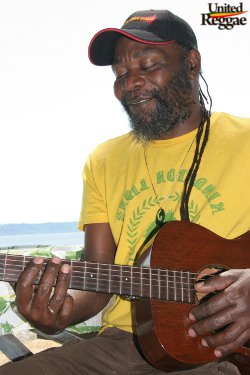 Unfortunately these days a lot of musicians or singers in the business are bad men or women, searching for something else to do, and they see music as a way out. If it keeps them out of trouble, it’s a good thing. But being an artist also comes with a responsibility. Right there you become a servant, you are serving the world, you are serving the younger generation, you are serving the people. So, what kind of service you want to give to the people? What kind of world you want to see out there? It’s in your hands now, you have to be careful of that. You are an artist, you are a poet, you are dealing with literature, you are putting out what tomorrow’s world is supposed to be like, or is gonna be like. It’s in your hands, so what are you doing towards it? It’s a big responsibility. It’s not just going out there, kick around, dance, collect some money and go back home. It’s way more than that. At least that’s how I see it.
Unfortunately these days a lot of musicians or singers in the business are bad men or women, searching for something else to do, and they see music as a way out. If it keeps them out of trouble, it’s a good thing. But being an artist also comes with a responsibility. Right there you become a servant, you are serving the world, you are serving the younger generation, you are serving the people. So, what kind of service you want to give to the people? What kind of world you want to see out there? It’s in your hands now, you have to be careful of that. You are an artist, you are a poet, you are dealing with literature, you are putting out what tomorrow’s world is supposed to be like, or is gonna be like. It’s in your hands, so what are you doing towards it? It’s a big responsibility. It’s not just going out there, kick around, dance, collect some money and go back home. It’s way more than that. At least that’s how I see it.
Who are your icons, artists you admire?
There is quite a few. There is the old Motown artists, The Temptations, The Impressions, Marving Gaye, there is James Brown too from that area. And then from Jamaica you have The Wailers that I admire a lot, there was a soul there you know. In terms of sweet singing, you have The Melodians, The Paragons, Dennis Brown. And then you have the church. I’ve been to a church as a kid and there were some sisters there who used to sing together and they had beautiful voices, I can’t forget about them.
So I catch little pieces from here and there and then I formulated my own.
Who are you favorite bass players?
Familyman, I love Familyman, he is always solid and he’s got creative lines. I love Lloyd Parks, he’s very fluent. Also Jacky Jackson, who used to be studio musician for Treasure Isle. He is a kind of bass player who is dancing from inside, without moving, but his lines are powerful. And Robbie, he is very quick and also very innovative. Last but not least, Lloyd Brevett of The Skatalites. Outside of reggae, there is also Ray Brown. He is a jazz bass player and he is just bad ass! He is not with us in the flesh anymore but the spirit lives on. And there is Bootsy Collins. He played with James Brown for a while. Another bad ass bass player! So many, I can’t remember all of them right now.
When did you decide that you will be one of them, that you will be living from music?
When I was about 9 or 10. It was a special day when all the schools around met in a stadium in Kingston, and The Skatalites were playing there. I was seated way at the back of the stadium, looking down at them and they were far away but I saw them having so much fun and the music was so sweet! I said to myself: That’s what I’m gonna do! It seemed farfetched at the time because I was a little country boy. But I worked towards it. I began to make little instruments, I took some pumpkins leaves and I used them to make little horns out of it, I also used bamboo joints to make little guitars things. And I made my own guitar when I was 10 or 11, with wood for the body and forks teeth for the fret. Later on I worked with my dad in the fields to make a little money, and so I could buy a guitar. And when I was around 15, I went to Kingston, I met The Gladiators some years after, and then that’s history!
Where you are living now, in Seattle, Washington, Northwest of the US, it’s more a place known for rock and jazz than reggae. Where did you find your musicians for Boogie Brown?
A lot of people wonder how I function around here, in this corner! Some of my musicians are schooled musicians (from a well known music school in Seattle, Cornish College of Arts), they play jazz and other music as well. The thing is, all of them they love good music. And I want to think that the music I perform is good music. Plus we get along, Boogie Brown is like a family, it makes it easier or easy. Even though sometimes it’s rocky because, again, Seattle is way in the corner of the US, so you have to venture out to work. You have to go far, and travelling is costly, so sometimes I have to go places without the band. I do acoustic stuff or I have other bands backing me up. With the intention that, I spread the word there, I pump the band up and hopefully I get Boogie Brown with me next time.
How do you work with musicians playing with you?
With patience. I don’t expect that someone just come in the band and know everything the first day. My thing is that, if today is better than yesterday, we are getting somewhere. And if tomorrow is better than today, then I know we’ll get there! The point is to get there. It’s not to fly there and then you have no ground to stand. When you get there, you need to be grounded. So we’re getting there and getting there slowly. I think my musicians respect that I’ve been patient with them. Because they are not Jamaicans and things like that, some people can be surprised. It happened we go places and some people would sometimes ask where the band is, while all of us are there. Just because the musicians do not fit to the image these people have in their mind. But then the music starts and the vibe changes!
Do you think your experience with Gladiators is helping you to deal with the musicians working with you?
Yes, it taught I how to respect musicians and how to exercise patience.
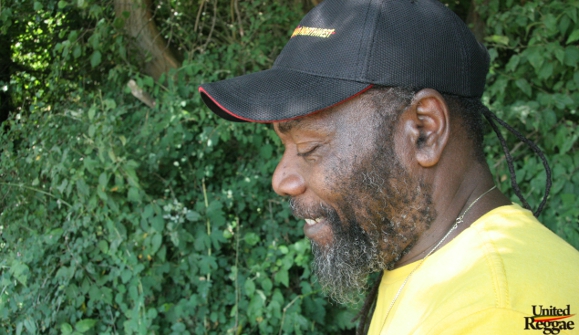
Where is the name Boogie Brown coming from?
Boogie Brown is a brain child. At the age of 13, he is like 30 years old. Boogie Brown grew up kind of delinquent. He could be a bad boy, do evil things, but instead he took music. That’s the story of Boogie Brown I’m actually writing!
Here Boogie Brown is a band. Boogie Brown confuses people because they think Boogie Brown is a blues band. They can’t really put it together, and in a way that is sweet to me. Because people have too much expectations. Again, I think good music should be spelled no other way but good music, and bad music should be spelled bad music. Not because the music is well promoted, then it is accepted as good music. If the music is good, then it should get some attention. Medias promote good music they say. But a lot of them fly pass all the good music and go to somebody who can pay 50 grands to promote something. No matter if the music is good or not, they’ll promote it as good music. Boogie Brown is kind of distorting all of that.
Earlier this month, you went in Guam, playing acoustic and with the Koko’s band. Shortly after you played in Brazil with the Mano Bantu band. How do you worked with musicians who are backing you up like these?
Whatever which group it is and wherever they are coming from, I try to see where they are at and how much they know my music. Then I try to make an assessment of how much we can get out of it within the time frame we have, and to work with that. But the very first thing is to respect. Respect the fact that they are willing to back me up, and this is not an easy work. Respect musicians as persons, as people, and be willing to give and take with them. Also, I don’t expect too much. I might have a bass line that goes certain way but I’ll take half of it sometimes. Because the bass player needs to be comfortable. Each musician need to be comfortable, so I make it be comfortable for them. I give a base line and I give a space so they can add something to it. To get the whole thing would be too much work, it would take too much time. But we just have two days, we just have one rehearsal, so I can’t ask them to treat the music like how it is on records! They are ways you know. You just need to respect and be open.
What I do think also is that a good song is hard to spoil. So the first thing to do is to make sure you have a good song. And the rest of it will be easier.
 Respect musicians as persons, as people, and be willing to give and take with them
Respect musicians as persons, as people, and be willing to give and take with them
Where do you think you have your fan bases today?
It’s seems like it’s almost becoming worldwide! I even receive emails or cd’s requests from places I haven’t gone yet. I know that I’ve quite a fan base in France, I got some in England too, although I did not go there with my present band (last time Clinton went in England was with Gladiators). I developed a good fan base in Brazil, and in the US of course, in Guam, in Canada… There is also a fan base in Kenya, I haven’t gone there yet but hopefully I will some day. And in Nigeria too, surprising enough! There is a couple of breddrins in Nigeria who works for a radio over there. I sent them materials and they love the stuff so each time I have a new album I send them a copy. When Obama won, one of them called me up and say: Listen, listen, can you hear that? And there was my music playing in the background. People had my music on their ghetto blaster and they were walking around celebrating the winning of Obama. That warms my heart!
That is to say, there are fans all over. It might not be a lot, but there are quite a few still. And I’m happy for that.
You released an acoustic album entitled 'Mi And Mi Guitar' in 2005 and you play acoustic in many places in the world. Why do you think acoustic reggae is so popular today?
Maybe because it’s different, it hasn’t been done before, it’s kind of new. I also think that you get closer to what the artist is saying. For me, the lyrics are very important in my songs and for sure you can hear them better with acoustic, because there is not a lot of instrumentation to hide them. It’s just me and my guitar, so it’s easier. And I think people gravitate to that.
Clinton is working at home on a new song. His guitar is an acoustic Martin from 1957.
This summer you will be touring with the artists of Inna Di Yard in Europe. You know Chinna for a long time, you played with him several times already.
Yes, for a long time! We used to play at Scratch together, we laid down several riddims together. Chinna also had a shop, downtown Kingston, called High Times, and a lot of musicians used to hang on there, rehearsing and things like that. People who wanted musicians to go on tour would quickly check High Times to see which musicians they could get. Chinna was always saying: Hey Basie, come check mi man! And I was telling him: Yeah man, I’m gonna check you, soon come! But it never happened, because my head was at a different place at that time. I was with Gladiatiors.
Much later on (it was in June 2006), I went to his place in Kingston, at the Inna Di Yard settings. I played bass there and we recorded some songs for a breddrin. Then we met again in France, at Zicalizes festival (in May 2007). Winston McAnuff and myself were on the bill; Chinna and Kiddus were guests. I ask Chinna to come on stage and we jam together. I totally enjoyed it!
And now we’ll be doing something together again, I’m a guest with Inna Di Yard! I’m looking forward to it, it will be fun.
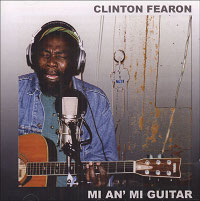 Are you thinking about a next acoustic album?
Are you thinking about a next acoustic album?
Yes I’m thinking about a next acoustic album, I just don’t know when it will happen yet. 'Mi And Mi Guitar' is a very steady album in terms of selling you know, it’s like one fan tells a next one about it and so on. I’ve done this first acoustic album a certain way and I learnt from it. The next one might be a little different, same principle but hopefully I’ll do it better.
How different?
I don’t know yet! The thing is, I have several songs that I wrote long time ago, in Jamaica. I found some of them on cassettes and I listened to it. Some of them, I probably just let them be as they are, recorded there with my own little material. It will be very raw, but they are real, and I think they are sweet in their own way. I might add some new stuff too. I’m not quite sure of how I’m gonna do it yet but a next acoustic album is coming.
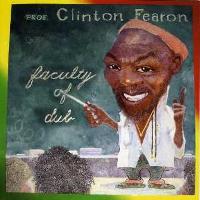 You also recorded a dub album almost two years ago, 'Faculty of Dub' from Professor Clinton Fearon. Do you think about doing another one?
You also recorded a dub album almost two years ago, 'Faculty of Dub' from Professor Clinton Fearon. Do you think about doing another one?
That one the students are still working on it and I don’t want to overload them with new lessons! I still give them at least another year before thinking about a new one…
'Mi Deh Yah' is actually your 8th album, considering your solo career so from the last 16 years. And you are writing songs for more than 40 years. Do you know how many songs you wrote so far?
This is hard to say! I wrote several songs that I don’t even remember anymore, and I never recorded them. I figured I would remember, just to realize that my memory didn’t serve me too right. Those are gone in the shuffle. I’m gonna make a wild guess and say that over all I maybe wrote 400 songs. There are a hundred and something recorded, maybe close to 200, I don’t know exactly. And many more unrecorded.
 I’m gonna make a wild guess and say that over all I maybe wrote 400 songs
I’m gonna make a wild guess and say that over all I maybe wrote 400 songs
You have a lot of unreleased songs…
Yes! Like I said, I found some songs that I recorded on cassettes in my backyard in Jamaica, long time ago. I had a little material to record several tracks, and so I was playing drums or little percussion, guitar, and singing. I was doing them like an album, recording several songs, and it’s kind of funny listen back to it. There is like 40 or so songs from that period (Clinton was in his mid thirties at that time). Who knows where there is others. I found plenty cassettes and did not get to play all of them yet. Time will come one day to do something with them!
You spent times at Studio One in your early years. How was it there?
That was so wonderful! I will always treasure my time at Studio One. I remember going there for the first time when I was 18 or so, wishing I could even get in the back. Much more to get in the studio! I looked thru a window to see what’s happening inside. Later I get in the operating room where the mixing goes on. And finally I get in the studio. The first time, Leroy Sibbles was playing bass. I think Richard Ace was also there playing organ. I don’t remember all the musicians. But I kept my eyes wide opened!
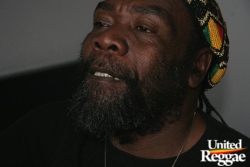 Later on I went at Studio One with Gladiators. We did quite a few songs there, including my first song recorded with the band, Jah Almighty. And many other singles (Roots Natty, Bongo Red, Jah Go Before Us, Mr. Baldwin, A Prayer To Thee, Rearrange…). I got a lot of experience there. I also met good musicians and singers. I remember some wished mi well, they let mi know that I was promising and told mi not to give up. Some of those musicians are not around today. But I remember and I have nothing but love and respect for them. Mark you, I get no money from Coxsone. But I get the experience and I respect that.
Later on I went at Studio One with Gladiators. We did quite a few songs there, including my first song recorded with the band, Jah Almighty. And many other singles (Roots Natty, Bongo Red, Jah Go Before Us, Mr. Baldwin, A Prayer To Thee, Rearrange…). I got a lot of experience there. I also met good musicians and singers. I remember some wished mi well, they let mi know that I was promising and told mi not to give up. Some of those musicians are not around today. But I remember and I have nothing but love and respect for them. Mark you, I get no money from Coxsone. But I get the experience and I respect that.
After a while we decided to have a self contain band. We knew Coxsone had some old instruments and because we didn’t get much money from him, we figured that maybe he would loan us them. So we checked him, and he accepted to give us the instruments. There was an old Hofner bass, a guitar, I can’t remember if there was a old drum set too. And we start the band. Albert was playing guitar, myself on bass, Winston Carty was on drums, I can’t remember if Gallimore Sutherland was with us at that time. We get a place to rehearse. It was behind the grocery store of a breddrin, we called him Teeth Man. He was cool and let us rehearse there. That was something.
Do you remember the last time you met Coxsone?
It was a long time ago, way in the eighties. And then I didn’t even see him before he passed away.
But you passed by Studio One not so long ago.
I passed by the studio maybe three years ago and saw miss Dodd. We chatted for a while. I think some money is even there for me that I haven’t gone to pick up yet! Soon come!
It’s only after you get instruments from Coxsone that you played bass in a studio. Do you remember the first time you get to be recorded playing bass?
I think the first recording we did as a band, with mi on bass, was with a breddrin we called Selassie Band’s Man. We called him so because he wrote a song titled Selassie Band’s Man. Oh man, it took a while! Part of it is because I was too excited. We rehearsed the song and I knew the song. But then comes the time to play it. 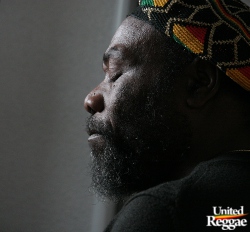 I reached quarter way, and I realized I’m going down on tape! Boom! I lost it! Until I managed half way and then, oops! Three quarter way, same thing. Everybody started to be upset about me! Finally, I did it.
I reached quarter way, and I realized I’m going down on tape! Boom! I lost it! Until I managed half way and then, oops! Three quarter way, same thing. Everybody started to be upset about me! Finally, I did it.
I learnt a lot that first time because while I was playing, I thought I was on it, like totally on it. But the others were saying: Hey, Bassie, you’re lagging behind man! And listened to it after I realized that I was off. I had to question myself because playing it faster was not how I was feeling the riddim. So I had to calculate my playing to get the line right. I understood later on that there are some songs where your fingers would just flow accordingly and it’s easy. And others you have to put some effort because of how the line goes and how familiar your fingers are with the notes. There is a thing there, I learnt that.
In 1974 Gladiators recorded some songs at Black Ark with Lee Perry, playing for different artists (like for Yabby You’s album, 'Jah Vengeance'). After that you staid without Albert there and spent some months with Scratch, and you recorded your own songs in the studio. Do you remember which songs you recorded there?
I remember Togetherness, which is actually the first song I did for myself. I recorded it at Black Ark with Scratch and brought it to a breddrin of mine named Sky High. The idea was, I do the song and he is selling it. I remember going by his house one morning, I almost wake him up out of his bed, telling him about the idea of a Sky High label, with the song Togetherness on the Sky High label. And he was industrious enough to open a little record shop and establish Sky High label. Everybody started to call him Sky High from then.
Untrue Girl was another song I did for Scratch.
You also recorded several bass lines at Black Ark.
Yes I did several bass lines for different artists and also just laid down riddims for Scratch. It was for songs like The Bells, Come Along, I remember that one was a good seller. 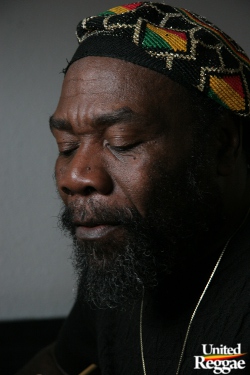 Roast Fish And Cornbread was also an excellent seller. And plenty others I can’t remember! My thing was just to play some bass, I didn’t pay attention to sales or even to make sure that I got my credits. I was just exited that I get a chance to play bass and loving the whole thing. Later on I realized how important it is to have your credits.
Roast Fish And Cornbread was also an excellent seller. And plenty others I can’t remember! My thing was just to play some bass, I didn’t pay attention to sales or even to make sure that I got my credits. I was just exited that I get a chance to play bass and loving the whole thing. Later on I realized how important it is to have your credits.
But it was quite an experience, a good experience. I would not change it for anything because that experience is part of the reason why I am the way I am today. So I respect it. Lessons.
Do you still have contact with Scratch today?
No, it’s a long time I haven’t seen Scratch. Last time I spoke with him it was when he came to play at the Experience Music Project in Seattle. I went down there just to catch the show, I was around the back talking with somebody when Scratch was about to go on stage. I checked him for a brief moment. That was the last time.
You wrote some poems and you also have a little story in the process somewhere… Do you think that one day you will publish a text book?
I think it will happen. I don’t know exactly when this will happen but it is in the back of my brain here to come forward! I wrote some poems that I think are saying something. I also have a little brain child story about Boogie Brown. I got like a hundred and something pages already, but it’s a long time I haven’t done anything about it. Some day I’m gonna complete it and put it out, for what it worth.
You actually presented your poems last year in France, during an acoustic tour in libraries. Here in the US you also go to schools sometimes, and other places as well, where you don’t just play guitar and sing but you talk with people. Why are you doing this, what do you have to say there?
When I started doing acoustic, it was kind of a fantasy to do it, to present my music from where it is coming from. There is something in acoustic that you do not get with a live band. And then when I started doing it, I realized I can actually have a good discussion with the audience, I can talk, have a dialog, and it’s easy, it’s calm, people are attentive. So I used that platform to tell the stories of the songs and eventually extend it to my own story. 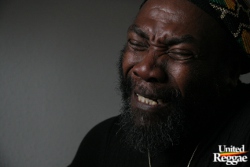 Tell what the songs are about, which is, basically, love. Love is the foremost story, is the primary story. Love. And then it’s about how to get to it, how to envelop it, how to let it treat you right, how to treat it right, how to behave, how to take care of ourselves, all of this in one. It’s not that I know how but I just want to put the cards on the table: are we really taking care of ourselves? Are we taking care of creation? How much are we giving to nature? Do we even recognize nature? All these are questions that sometimes I would love to get an answer from somebody. Doing those acoustic gigs, I think, is a wonderful media to talk about all this. My tour in the French libraries was a good eye opener. I remember seeing the look on people’s face and their attentiveness. And then when they walked away from the room after everything was over, the vibes they got and the smiles on their face you know, I remember that. It’s like, they went away with something and that to me is the pay. People walked away feeling good, feeling like it was a good purpose for them to come to the gig.
Tell what the songs are about, which is, basically, love. Love is the foremost story, is the primary story. Love. And then it’s about how to get to it, how to envelop it, how to let it treat you right, how to treat it right, how to behave, how to take care of ourselves, all of this in one. It’s not that I know how but I just want to put the cards on the table: are we really taking care of ourselves? Are we taking care of creation? How much are we giving to nature? Do we even recognize nature? All these are questions that sometimes I would love to get an answer from somebody. Doing those acoustic gigs, I think, is a wonderful media to talk about all this. My tour in the French libraries was a good eye opener. I remember seeing the look on people’s face and their attentiveness. And then when they walked away from the room after everything was over, the vibes they got and the smiles on their face you know, I remember that. It’s like, they went away with something and that to me is the pay. People walked away feeling good, feeling like it was a good purpose for them to come to the gig.
I’ve done some more of it at schools, here in the US, and it’s the same vibe, from teachers to students you know, really. The thing is, I’m not conventional, I come straight from the heart with what I’m coming with. It might not be proper, but it’s coming from the heart. And what I do observe is that people, even the straight people, all sharp cut, they respect when you come from the heart with something. Even if they can’t afford to do it because of their work and things like that, when they see it, they respect it. For all this I love every minute of these kind of events. And I hope and wish to do much more of it.
 My philosophy is that we are created out of love and so therefore we should love and honor love. Love to love, respect it in every way
My philosophy is that we are created out of love and so therefore we should love and honor love. Love to love, respect it in every way
Your songs present pieces of your personal views. Can you explain what is your philosophy?
My philosophy is that we are created out of love and so therefore we should love and honor love. Love to love, respect it in every way.
I also think that, as people, we create our own reality. Even when you join an organization, a church or whatever what, even if this group is making a common decision and you agree with, even though, you are coming with your personal view and understanding. Everyone is coming with their own reality and is trying to share it with somebody else and it’s all intertwine. That’s why we are all so interesting and that’s why no one of us look exactly alike either. Meaning that we are all equally important. We are no less or greater than the next person. That’s my philosophy. And that’s why I look anyone in the eyes and I let them look right forward in the eyes as well. What get mi down is when someone looked mi in the eyes and quickly look away as if I’m not there. They are telling you that you are not important for them to even look at you. In the same breath, they cannot survive without you because that pump up their power!
Where can we see you live on stage this year?
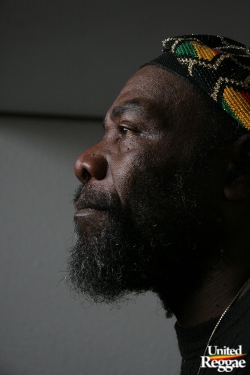 Right now I’m getting ready to be on stage with Inna Di Yard for some dates in Europe from mid July to beginning of August. We’ll be at The Garance Reggae Festival, we’ll be in London, in other festivals in Belgium, in Germany and so on. I also will be at the Lowell Folk Festival in Boston with my band in July. Later in August, we’ll be in Alaska and other places in the US.
Right now I’m getting ready to be on stage with Inna Di Yard for some dates in Europe from mid July to beginning of August. We’ll be at The Garance Reggae Festival, we’ll be in London, in other festivals in Belgium, in Germany and so on. I also will be at the Lowell Folk Festival in Boston with my band in July. Later in August, we’ll be in Alaska and other places in the US.
We are also working with Furax (French promoter) to built a tour in France with Boogie Brown from late September unto October. I’m highly excited about this one, especially with the present line up of the band. I know that we’ll definitely make a big difference.
And then a little bird is saying that I’m going to play in Peru in December. So it’s a bunch of different things. I’m looking forward to it!
Read part 1 of this interview which is dedicated to 'Mi Deh Yah', from the creation process to the distribution of the album.
Photos copyright Catherine Fearon 2010
Reproduction without permission of United Reggae and Catherine Fearon is prohibited.
Read more about this topic
Read comments (1)
| Posted by Terry B - Tivy on 09.15.2010 | |
| Right on target Natty Clinton..Much respect. It pleases my heart to see you've stayed true to your mission. Looking forward to see the I soon. Peace and blessings | |
Comments actually desactivated due to too much spams
Browse by categories
Recommended Articles
Latest articles
Recently addedView all
© 2007-2026 United Reggae. All Rights Reserved. Reproduction in whole or in part is prohibited. Read about copyright
Terms of use | About us | Contact us | Authors | Newsletter | A-Z














